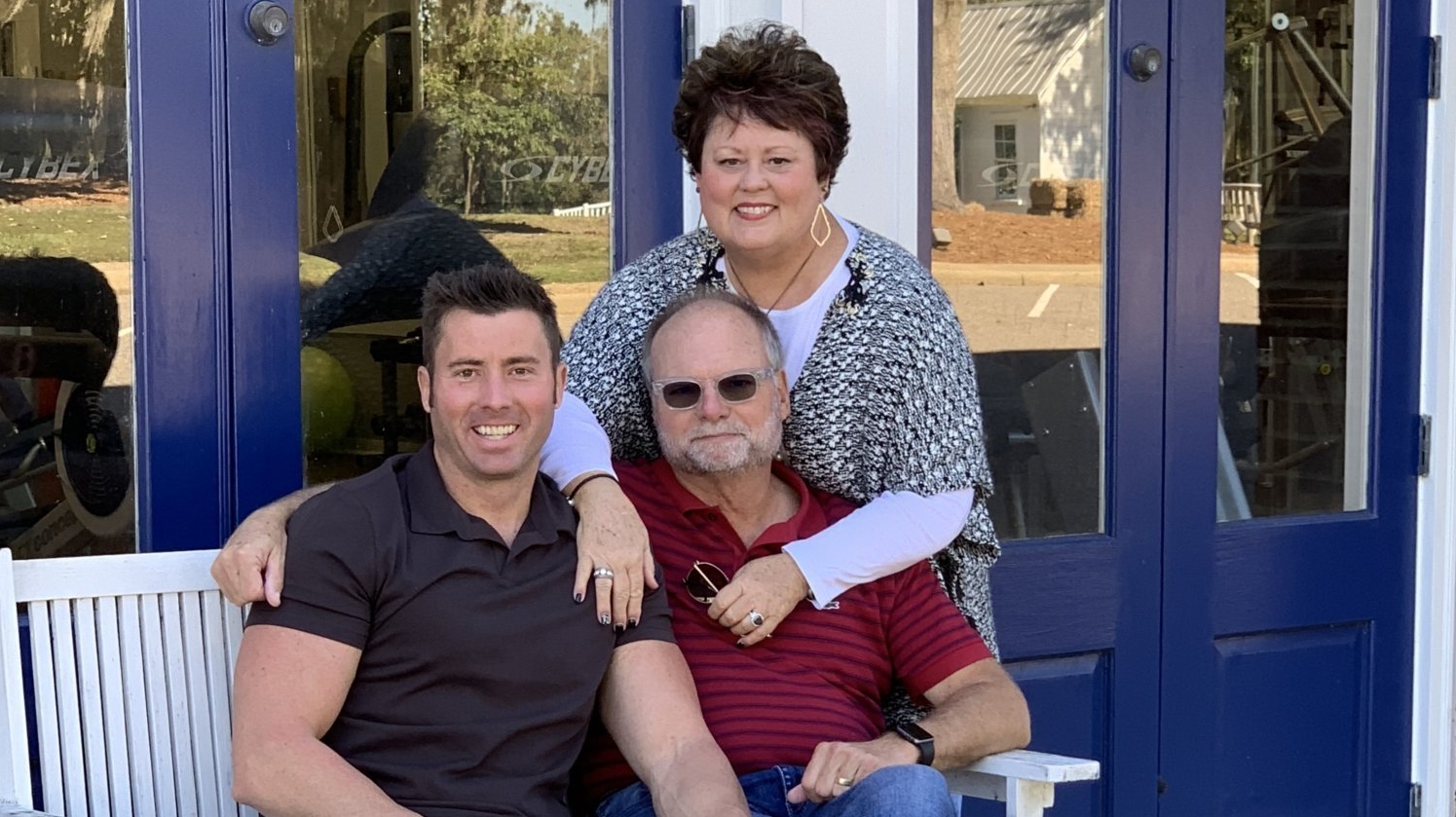The parole officer who wrote the report for Patrick Barnes called him a “model inmate” with no infractions during his years in state custody.
He’d taken numerous classes, was “truly remorseful” for his crime, the parole officer wrote, and was serving in the least restrictive of Alabama’s prisons, where he’d worked at the same job for three years with no negative reports from the company.
The parole officer who wrote the report is known to be tough in her assessments, and yet she found Barnes to be a low risk and recommended his parole. Still, the Alabama Board of Pardons and Paroles denied his parole in a 2019 hearing.
Nothing has changed in Barnes’ record since the 2019 hearing, his parents told APR recently, yet Barnes was again turned down for parole by a new three-member board at a July 14 hearing. He’s served 10 years of a 20-year sentence for manslaughter connected to a fatal 2008 DUI crash, and is next eligible for parole in 2026.
Barnes’ case is one of thousands in Alabama’s incarcerated since 2019 who have, in greater numbers than ever before, been denied parole and pardons, despite some having stellar records and having done all that the Alabama Department of Corrections has asked of them.
But Barnes’ 2019 parole denial, through no fault of his own, is also linked to the impetus behind Alabama’s dramatic reduction in pardons and paroles in recent years, a tragic crime that occurred a year before, which set off a series of changes that continue to impact thousands serving in Alabama’s deadly prisons.
Former Pardons and Paroles Board chair Lyn Head served for just more than three years, and resigned in October 2019.
The former prosecutor told APR that she recalled pressure on the board in her last year following the release of Jimmy O’Neal Spencer two years before. Spencer is charged with killing three people, including a seven-year-old child, in Guntersville following his release and after he walked away from a halfway house in 2018. His trial is set for January.
Head explained that, facing that pressure, she and the other board members had voted to deny the parole of a man in 2019, despite the man’s records pointing to him being an excellent candidate for release.
“The next day I told the other two board members I’ll never vote to deny somebody’s parole again, when everything in their file says that they should get paroled, based on our training,” Head said.
When APR shared that parole report with Head last week, Head said she realized it was the same man she’d voted to deny and ever since regretted.
“Now I know that it was Patrick Barnes’s case,” Head said.
Patrick Barnes, 39, pled guilty in 2010 to manslaughter for the 2008 drunk driving accident that killed 21-year-old Renota Tyus. Barnes was unconscious when he arrived at Jackson Hospital, according to police statements in court records.
There were no witnesses to the crash, Barnes’ parents said. Barnes told a Montgomery police officer five days after the accident that he remembered pulling up and stopping at the traffic light, then proceeding, but nothing else.
“That’s as far as it goes,” Barnes told the officer.
Tyus’s cousin told that same officer in a separate interview that Tyus had just dropped him off at his home and was headed to his girlfriend’s house and that Tyus told him he was tired. Asked by the officer if it seemed like Tyus could operate his vehicle, the cousin said yes, and he had no problems driving the cousin home, according to court records.
The parole officer’s report on Barnes, drafted to be considered by board members in the 2019 hearing, showed Barnes has never had any infractions in the decade he’s been in state custody, where he served four years at Bullock Correctional Facility and the remaining time in minimum security work release, the lowest level of custody in Alabama.
Beginning in 2011, Barnes has completed seven educational courses, including courses on domestic violence, re-entry, criminal thinking and career readiness, according to the report.
Despite statements in news accounts, a search of Patrick Barnes’ criminal records in Alabama showed no other previous charges or convictions for driving under the influence. It’s unclear if that same incorrect statement about Barnes having had previous DUI convictions were made in letters to the board for their consideration in his July 14 hearing. Such documents aren’t made available to those incarcerated, their families or attorneys representing them.
The report, which APR obtained but aren’t typically publicly released by the Alabama Bureau of Pardons and Paroles, also includes Barnes’ Ohio Risk Assessment Re-entry Tool report, known as an ORAS report, which is used by many states to help assess an incarcerated person’s likelihood of reoffending and how best to target interventions. Barnes’ report rates him at the lowest risk.
“This IPO is experienced. She’s thorough, and she was hard. She was tough,” Head said of the institutional parole officer who interviewed Barnes and drafted the report board members were to review at his last hearing.
Declining numbers
Alabama’s parole grant rate between 2013 and 2018 increased from 30 percent to 53 percent, but in the following two years, and after the appointment of Pardons and Paroles Board chair Leigh Gwathney in October 2019, the parole grant rate dropped to 20 percent, according to the Alabama Bureau of Pardons and Paroles data.
Following the murders Jimmy O’Neal Spencer is charged with, Gov. Kay Ivey in July 2019, appointed Charlie Graddick as the director of the Alabama Bureau of Pardons and Paroles. Graddick is a former circuit judge, state attorney general and architect of Alabama’s Habitual Felony Offender Act.
Days after he began at the bureau, Graddick suspended parole hearings, and alleged problems with the agency’s victim notification process, something Head has said is untrue. Hearings resumed in November 2019, but the number of people being seen by the board dropped dramatically.
The bureau’s messaging to the public during Graddick’s tenure changed, with numerous tweets and press releases centered around informing the public on how dangerous and “violent” those seeking paroles are. After APR began asking questions about the change in messaging, the bureau reversed course and removed the focus on violence from press releases and tweets.
Graddick resigned in November 2020, and former state Sen. Cam Ward was appointed to replace him.
The largest drop in paroles has happened in Alabama’s minimum-security prisons, according to an Aug. 27 report by the ACLU of Alabama’s Campaign for Smart Justice, authored by investigative reporter Beth Shelburne.
The report notes that ADOC’s work centers and work releases are to “assist selected inmates in preparing for release and to aid in making the transition from a structured institutional environment back to the community,” according to ADOC’s administrative regulations.
Since 2017, paroles in Alabama’s work centers fell 93 percent and paroles from work releases fell 88 percent, and from the beginning of the COVID-19 pandemic through June, the monthly number of paroles in all of four of the Alabama Department of Corrections security level prisons (close-security, medium-security, work centers and work release) have fallen to a low of five people or less, according to the report, which cites ADOC monthly statistical reports.
Alabama Rep. Chris England, D-Tuscaloosa, has been a vocal critic of the Pardons and Parole Board’s drastic drop in paroles, and of board chair Leigh Gwathney.
Since November 2019, a month after Gwathney’s appointment, through June 2021, the board granted 25.5 percent of all white applicants’ paroles, or 751 of 2,948 considered, according to board data England shared in a tweet, but granted just 11.9 percent of all Black applicants’ paroles, granting 349 and denying 2,580.
“Of the 1104 Paroles granted, 68 percent of them went to White applicants,” England wrote.
During that same timeframe, the board has granted just 14 percent of all Black applicants who received a pardon hearing, while granting nearly double, or 27 percent, of all white applicants who received a hearing, according to the board data England shared in a tweet.
The board denied 1,792 pardons for Black applicants and granted 313 during that time, and denied 1,565 white applicants, granting 601. White applicants made up 65 percent of the 916 pardons given.
More recently, the racial disparities in paroles is even more stark. Between Jan. 1 and July 31 the board has denied paroles for 90.7 percent of Black applicants, and 76.9 percent of white applicants, according to a memorandum England received from the state’s Legislative Services Agency, which England shared in a tweet.
“I have a lot of compassion for all three of the board members, Because they are under pressure,” Head said. “Unfortunately, none of them has been provided with the necessary training in the industry-wide recognized standards for considering somebody’s parole.”
Head, during her time on the board, received training from national and international organizations on best practices and the tools used by many to determine parole decisions. She said she hopes the current board members will receive the same training, which she explained opened her eyes to the data behind such practices.
Head said she understands, through talking with someone familiar with the matter, that the pardons and paroles board is no longer taking recommendations from institutional parole officers on whether to release an incarcerated person.
“The job description of the institutional parole officer is to investigate each candidate for parole for the purpose of reporting to the board regarding the results and any conclusions from that investigation,” Head said.
APR asked an Alabama Bureau of Pardons and Paroles spokesman whether parole officers were told to stop including recommendations on whether to release incarcerated people in their reports.
“Institutional Parole Officers do not make recommendations for if an offender should be paroled,” the spokesman said in response.
APR in follow-up questions asked when the change occurred, and who made that decision, noting the parole officer’s 2019 recommendations for releasing Barnes.
“Due to a change in policy, IPOs were advised to end making recommendations for denials or grants of parole in September 2019 at the beginning of the previous administration,” the spokesman responded on Thursday.
Gwathney did not respond to questions sent to her through the bureau’s spokesman.
During Graddick’s tenure, the number of incarcerated people being set for pardon and parole hearings dropped significantly, but after his resignation and the appointment of Ward, the numbers of applicants receiving hearings has increased.
“Over the last year we’ve increased the number of people being submitted to be considered for parole we feel like are eligible for parole, and we will continue increasing the number of people we submit for the board to make the decision that they’re allowed to make under the statute,” Ward told APR on Thursday.
The bureau is responsible for selecting applicants and setting heatings, but the Pardons and Paroles Board has sole decision-making authority over releases.
“Once we submit a name to the board they have total discretion,” Ward said.
A family separated
“He has served enough time for his part in this accident. It’s time for him to come home,” Pat Barnes, Patrick’s father, told APR by phone recently. “He is doing everything that he has been asked to do. He’s no threat to society.”
Patrick’s mother, Debbie Barnes, told APR that while her son has been in work release, prior to that work ending amid the COVID-19 pandemic, he has acted as the inmate liaison to the warden.
Board members during pardon and parole hearings deliberate on cases out of the public view, and incarcerated people, their families and attorneys aren’t given access to the letters submitted by victims and victim’s advocates, so there’s no way for the other side to rebut whatever information those letters contain, the Barnes’ said.
Alabama doesn’t allow incarcerated people to attend their own pardons and paroles hearings, they and their attorneys aren’t given access to the documents used by the board to make their decisions, and board members deliberate those decisions in executive session and outside of public view. The lack of transparency troubles many who say the odds are stacked against the incarcerated.
“There’s no other stage in the criminal justice process in Alabama that doesn’t afford the individual an opportunity to be heard, and to review all documents to be considered by any tribunal before it makes a decision which affects his or her liberty,” Head said. “And we even share the documents with them that we’re basing our decision on.”
“What are we afraid of? That’s what I want to know. Are we afraid for them to see it?” Head said, noting that in some instances letters she received as a board member might have presented a public safety concern for the persons who wrote the letters. “The incarcerated individual should be entitled to everything that the board considers, unless there’s a public safety interest in keeping the information confidential.”
Asked if they have any hope that at the next hearing their son will be released, Pat Barnes said “we have hope every day.”
“That’s all we have, is hope,” Patrick’s mother said, her voice cracking with emotion.
Shelburne, the investigative reporter who has tracked and reported on Alabama’s deadly prisons and troubling changes at the Pardons and Paroles Board, said Patrick Barnes is one of thousands who have been denied parole.
“Not based on the evidence presented to the board, but based on a categorical decision to deny people who have violent offenses, no matter what,” Shelburne said.
Shelburne said the board is able to operate with wide discretion as to whether to follow the board’s own administrative rules and the guidelines established by state law. The board also operates with little transparency.
Those seeking pardons and paroles in Alabama don’t get to hear board members deliberate their case, don’t typically get access to the documents used in the decision-making process, and the incarcerated person isn’t allowed to attend their own hearing.
“Anybody can write a letter and say anything and nobody is able to dispute it. The whole parole process, there’s very little due process,” Shelburne said.
Shelburne said she’s asked the Alabama Attorney General’s Office whether the office has ever issued support for any parole to the board. The state AG’s office often submits opinions to the board for consideration in hearings.
“And I have not gotten an answer, so the answer is no,” Shelburne said. “What that tells me is this isn’t evidence based. These are categorical positions and they’re not looking at individual cases. They’re taking categorical positions based on the type of offense, not based on the individual.”
Head said the current board is “clearly” not following those guidelines, which she said are patterned after states that have been successfully handling pardons and paroles for decades.
Trying cases all over again
David Files was convicted of murder in 2006, and was sentenced to life with the possibility of parole. Files has maintained the shooting death of his girlfriend, Carlie Little, was an accident. He had no prior criminal record except for a charge of driving with a suspended license, a charge that was later dropped, a search of those records found.
David’s parents, David Sr. and Diane Files, told APR that their son and his girlfriend had been using drugs for days on end before the shooting, and both had become paranoid after someone began threatening them. David Sr. said they had also received threatening phone calls from someone.
Files said his son had asked the girlfriend to go into a back bedroom where their infant was, then while walking down a hallway he heard window blinds rattle in a room at the front of the house. He pulled his shotgun and fired three times into the dark room, his father said.
“And it was Carlie. She was sitting there looking out the window,” David Sr. said.
“Carlie lost her life that night because of my actions,” David wrote Shelburne in a letter, which she included in an article on Files. “I hate myself for what happened so I can’t blame anyone for hating me. But it is also a fact that it was not intentional murder, but a very sad accident.”
Files was transferred to ADOC’s minimum-security Red Eagle facility in 2018, and despite a parole officer’s assessment that Files scored the lowest possible risk for committing a new crime, Shelburne reported, the pardons and paroles board denied his parole in a February hearing.
“The board’s reasons for denial were limited to factors that David cannot change- the severity of the offense and negative input from stakeholders,” Shelburne wrote.
Davis Sr. said the prosecutor of his son’s trial, William Dill, attended the parole hearing and brought photos of the crime scene, telling the board that “I’ve got pictures back here. This is one person that does not need to get out of prison. He cannot be rehabilitated.”
“He was trying the case again right there for the parole board,” Files said.
“There’s always hope,” Diane Files said of the chance for parole at the next hearing, which is set for 2025. “That’s one thing that we’ve always taught our son, is that there’s always hope.”
While families cling to hope, the large number of denials is sending a clear message to those still locked inside Alabama’s deadly prisons, Shelburne explained.
“I’m supposed to do ‘A’ to achieve ‘B’, which is parole, and this parole board has essentially snatched ‘B’ off the table,” Shelburne said.
For those who have served many years with no disciplinary infractions, and who are being denied parole based on the type of conviction they received, Shelburne said for them it means “what they have done with their lives doesn’t matter.”
“Why do the right thing when it doesn’t matter? I’ve heard that from a lot of people, this sense of futility. What has all of this been for?” Shelburne said.
The violence in Alabama prisons has only gotten worse in recent years. In December 2020, the U.S. Department of Justice filed a federal lawsuit against the state of Alabama and the Alabama Department of Corrections alleging violations of inmates’ constitutional rights to protection from prisoner-on-prisoner violence, sexual abuse and excessive force by prison guards.
Shelburne has been tracking avoidable deaths, which include homicides, suicides and drug-connected deaths, inside Alabama’s prisons since 2018. Getting a clear picture on violence inside Alabama prisons isn’t easy, because the ADOC doesn’t typically release such information unless a reporter learns of a death and asks the department for confirmation.
Alabama prisons have seen at least 31 such avoidable deaths this year, Shelburne said, with four months left in the year. She noted that in 2019, there were 29 such deaths for the entire year.
“There is so much despair. It’s incredible. They do not know what to do,” Shelburne said.





















































